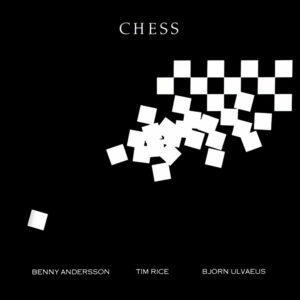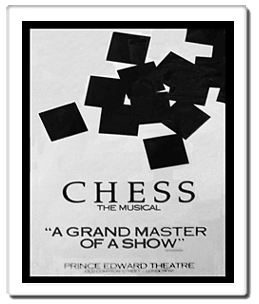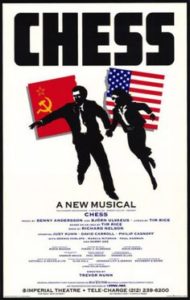Livia Genise & ACT’s Chess
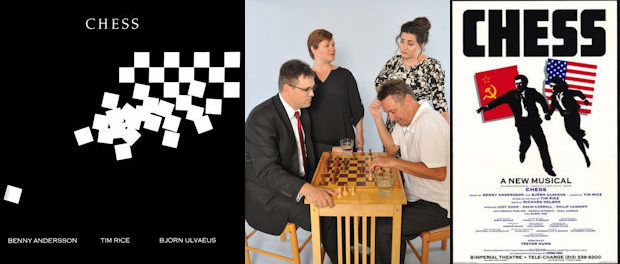 Original concept album (left), original Broadway production poster (right) and cast of the Genise-ACT production of Chess (center - Alex Boyles, Rebecca Campbell, Haley Forsyth & David King Gabriel)
Original concept album (left), original Broadway production poster (right) and cast of the Genise-ACT production of Chess (center - Alex Boyles, Rebecca Campbell, Haley Forsyth & David King Gabriel)
Livia Genise & Ashland Contemporary Theatre’s Chess: Theatergoers WIN!
– by Lee Greene
On Saturday evening, Sept. 17, 2016, I had the pleasure of viewing the opening performance of the Livia Genise Productions and Ashland Contemporary Theatre’s collaborative concert version production of the musical, Chess, at Ashland Community Center. Chess, created by the makers of the hit Broadway musicals, Joseph and the Amazing Technicolor Dreamcoat, Jesus Christ Superstar, and Evita (Tim Rice), Mama Mia and the fat portfolio of pop hits by the group Abba (Benny Andersson and Bjorn Ulvaeus) is the story of an epic chess battle between the Russian champ and the American Champ, fraught with intense political, financial, personal and romantic baggage, set as a complex rock opera presenting 36 musical numbers. Going straight to the bottom line: who wins? Without a doubt, the theatergoing audience! This was an exceptionally well presented, sung, and acted piece of theater, showcasing an outstanding cast, and bravura performances.
Before going much further, I want to confront head on the elephant in the room. Chess was supposed to be staged as a full musical production at Talent’s Camelot Theatre this month, as part of their 2016 season. But the Camelot board canceled that show, leading to the departure of artistic director Livia Genise from Camelot, and Camelot Theatre’s staging of the alternate play, Dirty Rotten Scoundrels instead. As previously reviewed in Performing Arts Reviews [http://performingarts.reviews/2016/09/06/camelot-theatres-dirty-rotten-scoundrels/], Scoundrels was a successful production, which opened opportunities for some newcomers on and behind the stage. Ms. Genise took that Chess production, cancelled by Camelot Theatre, and the cast and production team she had assembled for it, and in collaboration with Jeannine Grizzard’s Ashland Contemporary Theatre reworked it in a concert version (i.e., shorn of sets, props, costumes, extensive staging, elaborate stage lighting and special effects; so stripped down to the cast’s essential singing and acting on a bare stage) offered in roughly the same time frame. The result was to bring into sharp focus what an extraordinary cast of all-star performers Ms. Genise had assembled for the production and to direct all attention to their multiple exceptional performances, outstanding singing, and exquisite dramatic acting, with little else to distract, overshadow or compete with their performances. This production of Chess in effect demonstrated that in her time at Camelot, Ms. Genise had succeeded in attracting and retaining an outstanding group of actors and directors; that she is, as she had consistently been at Camelot, highly successful (in all critical respects) at mounting a show; and also is exceptionally good at choosing plays to present. Once again, going to the bottom line, who wins in the scramble that moved Ms. Genise from Camelot Theatre to a new theatrical environment? Theatergoers! (who now get BOTH Camelot‘s offerings under new personnel AND Ms. Genise’s in a new environment).
Now, as always, for those with the interest and patience to wade through my lengthy exposition: the details. A little background about the development and history of the musical, Chess, will go a long way to helping understand the sharp division between Ms. Genise’s enthusiasm for the show, and the Camelot board’s aversion to staging it as part of their season.
During the Cold War between the U.S. and the U.S.S.R. in the mid 1970s, Tony Award winning Broadway musical creator Tim Rice developed an interest in creating a musical about how the cold war affected those whom it touched. He had been fascinated by the infamous 1972 Match of the Century chess match between Bobby Fischer and Boris Spassky and the political machinations surrounding it, and got the idea to tell his Cold War story “through the prism of the long-standing U.S.-Soviet chess rivalry.” [Wikipedia, Chess (musical), https://en.wikipedia.org/wiki/Chess_(musical)] When his usual collaborator, composer Andrew Lloyd Webber, was tied up creating his independent musical, Cats, Rice teamed up with Abba musicians/composers Benny Andersson and Bjorn Ulvaeus to create the songs for Chess, working on the project through 1982 and ’83. [Id.] To raise money to fund a West End production of the show and gauge public interest, the music was recorded, released and marketed as a concept album. The music on the album was described by The New York Times as “a sumptuously recorded… grandiose pastiche that touches half a dozen bases, from Gilbert and Sullivan to late Rodgers and Hammerstein, from Italian opera to trendy synthesizer-based pop, all of it lavishly arranged for the London Symphony Orchestra with splashy electronic embellishments”. A single from the album, One Night in Bangkok became a worldwide smash, reaching #3 on the US Billboard Hot 100. [Id.]
The success of the concept album was followed in May 1986 with the premiere of a London West End production. The West End production expanded the storyline of the concept album and added considerably more spoken lines to the songs on the album. [Id.] In contrast to the album, the West End production received wildly mixed reviews. “Most of the naysaying notices had comments ranging from ‘far too long’ and ‘shallow, improbable story masquerading as a serious musical’ from The Sunday Times to The Guardian‘s conclusion that, ‘A musical is only as good as its book, and here one is confronted by an inchoate mess.’ Other newspapers posted rave reviews however. The Daily Telegraph wrote that the show was ‘gift-wrapped and gorgeous…compels admiration,’ The Times noted that ‘it turns out to be a fine piece of work that shows the dinosaur mega-musical evolving into an intelligent form of life’ and Today called it ‘gripping, eye-catching . . . nearly a major triumph.’” [Id.]
“After the West End production, the creative team decided to reimagine the show from the top down, leading to a second major stage version of the musical intended for American audiences, with considerable differences from the British version in both plot and music. . . . The story changed drastically, with different settings, characters, and many different plot elements, although the basic plot remained the same. . . . Benny Andersson told Variety: “The main difference between London and here is that in London there is only about two or three minutes of spoken dialog. Here, in order to clarify some points, it is almost one-third dialog”. [Id.] The Broadway production opened at the Imperial Theatre on April 28, 1988, but “did not manage to sustain a consistently large audience and closed on 25 June, after 17 previews and 68 regular performances.” [Id.] Gerald Schoenfeld, co-producer of the show, noted: “. . . . The show needs a $350,000 weekly gross to break even, but only a few weeks since its April 28 opening have reached that.” [Id.]
Many critics panned the show, most notably Frank Rich of The New York Times [The New York Times, REVIEW/THEATER; In Trevor Nunn’s Musical ‘Chess,’ East Faces West Across a Board, Frank Rich, http://nyti.ms/2cRaVuw], who wrote that “the evening has the theatrical consistency of quicksand” and described it as “a suite of temper tantrums, [where] the characters … yell at one another to rock music”. Howard Kissel of New York Daily News complained that “the show is shrilly overamplified” and “neither of the love stories is emotionally involving”, while Newsweek magazine called the show a “Broadway’s monster” and opined that “Chess assaults the audience with a relentless barrage of scenes and numbers that are muscle-bound with self-importance”. [Wikipedia, Chess (musical), https://en.wikipedia.org/wiki/Chess_(musical)] Benny Andersson commented in Variety on the negative Broadway reviews: “I really don’t know why they don’t like it. … I do know that most of the audiences so far stand up and cheer for everyone at the end. They appear to get emotionally involved with the show, and they really like it.” [Id.]
“Later, the musical developed a cult following based primarily on the score. . . . In 2001, in an interview with the San Francisco Chronicle, Tim Rice admitted that after the ‘comparative failure of Chess, his all-time favourite, he became disillusioned with theatre.’ He commented, ‘It may sound arrogant, but Chess is as good as anything I’ve ever done. And maybe it costs too much brainpower for the average person to follow it’” [Id.]
So there we have the makings of the differences between Ms. Genise and the Camelot Board, with Ms. Genise appreciating the well done and much beloved score and the show’s ability to emotionally draw in and involve appreciative audiences, while the Board was looking at the financial bottom line, and the show’s poor track history, failing to break even financially.
The version of the show produced by Ms. Genise with the Ashland Contemporary Theatre follows the story in the American Broadway production, as distinguished from the earlier West End production and concept album. A few words about the plot: The American Chess is about one chess match; Act 1 depicts the first part of the match, held in Bangkok, Thailand, while Act 2 presents the conclusion, in Budapest, Hungary. In Act 1, the wild-tempered American challenger, Freddie Trumper, arrives with his chess match second, and presumed lover, a childhood Hungarian émigré to the US, Florence Vassy, at an international chess tournament in Bangkok, Thailand. Also present, with his chess match second, Alexi Molokov, is the current world champion, Anatoly Sergievsky, who is unhappy with his career’s empty fame. Meanwhile, Florence is unhappy with Freddie’s absorption with his seedy financial agent, Walter DeCourcy, and focus on making money. Freddie interrupts the match with a money making ploy and eventually ends up fighting with a disgusted Florence, who realizes she needs to leave him. Florence is left alone with Anatoly by Freddie, who goes off to indulge in the seedier side of Bangkok nightlife (i.e, an apt excuse for a hit song about that nightlife, the aforementioned One Night in Bangkok. Florence and Anatoly, left alone together, discover romantic feelings for one another. The rift with Florence unsettles and distracts Freddie, who finishes the first round poorly with 5 losses and only one win; one more loss will cost him the match. Freddie blames Florence, who finally leaves him. Walter secretly arranges for Anatoly to defect from the Soviet Union to the U.S. Almost all of this is sung, of course, in very musical, rock pop songs.
After intermission, as Act 2 begins, it is eight weeks later and everyone is in Budapest for the conclusion of the chess match. Florence is thrilled to be back in her birthplace, but distraught that she has no memories at all of it or her childhood. Anatoly is now an American émigré, and he and Florence are lovers. Their relationship hits a bump in the road though, when Anatoly’s estranged Russian wife, Svetlana, arrives in Budapest to attend the match. Molokov, who has been embarrassed by and blamed for Anatoly’s defection, is still present as his second, but with considerable tension between them, and is actively pursuing ways to draw Anatoly back home to Russia, including arranging the arrival of Svetlana, threatening Anatoly’s brother’s family with the loss of privileges, etc. As a result of all the personal and familial distractions, Anatoly’s concentration on the match is impaired and he now loses five games in a row, tying the match and setting up a winner take all final game. Surprisingly in the midst of all his hostile manipulation, Molokov offers to help Florence find her long lost Hungarian father. He subsequently tells Walter that Florence’s father is alive in Budapest. Walter, who has a clandestine interest in coordinating an exchange of displaced countrymen with the Soviets, is happy to relay this to Florence. Florence turns to Svetlana for solace. The news of Florence’s father completely destroys Anatoly’s focus on the match, and he asks Freddie for a postponement, which Freddie flatly refuses, singing about the childhood (Pity the Child) that made him the (expletive deleted) which he is today. Molokov then brings Florence to meet the man who says he is her father and they have a joyous reunion. This places Anatoly on the horns of a dilemma: if he wins the match and remains a refugee, the Soviets will never allow Florence’s father to be reunited with her; if he loses the match and returns to Russia, Florence can be reunited with her father, but Anatoly will be separated from Florence forever. My regular readers know I NEVER give away an ending, so they will not be surprised that I stop here. The authors construct a very interesting denouement, with a few twists. But if you want to know how it ends, you’ll have to go to the show. And again, almost all of this is sung in very musical, appealing rock pop songs (another 17 of them in Act 2, after 19 in Act 1).
So now, about the Genise and A.C.T. production. As I said at the outset, the cast is extraordinary across the board, singing and acting on a bare stage, with few distractions. This leaves them fully exposed and showcases their exceptional performances, outstanding singing, and exquisite dramatic acting. For the two male leads, Anatoly and Freddie, Ms. Genise cast her Camelot regulars, Alex Boyles and David King Gabriel, respectively, who most recently won raves teaming up as the gay couple Georges and Albin (Zaza) in Camelot’s La Cage Aux Folles. I described Boyles’ performance in La Cage saying, “Boyles gives us the not-so-straight straight man . . . with great acting, wonderful singing, and most importantly, totally believable, heart-string tugging exceptional rapport [with the other characters].” [http://performingarts.reviews/2016/06/26/camelot-theatres-la-cage-aux-folles/] He’s even better here as Anatoly. His singing is quite wonderful, but his acting, his interactions with the other characters, reactions, gestures, facial expressions, etc. is spectacular. Not very long into the show, it became apparent that this presentation, without sets, costumes, special effects, etc., was totally succeeding – it was achieving the theatrical holy grail of “suspension of disbelief”; in other words, I and the rest of the audience were completely drawn into the characters and the story, despite the bare stage and absence of the usual theatrical devices and tricks. It was just as Benny Andersson told Variety, the audience was “emotionally involved with the show”, and Mr. Boyles highly credible, believable performance had a lot to do with that.
I have previously written that Mr. King Gabriel “gives a career highlight performance” in La Cage. [Id.] I’m not going to amend that here. Of his acting in La Cage, I wrote, “”His performance is wonderful, hilarious, captivating and bravura. . . . His acting is spot on, gestures, movements, expressions that all fit the character.” [Id.] The description is equally applicable to his acting once again, as Freddie here. To be honest (brutally so, sorry David!), his singing was more uneven in Chess. Some was less than at the top of his game. But he did rise to the occasion, and when it counted most, Freddie’s touching solo (Pity the Child) in which he explains how he became who he is, King Gabriel sang as well as I’ve ever heard him, paired with near perfect dramatics and believable emotions (again irresistibly drawing the audience in).
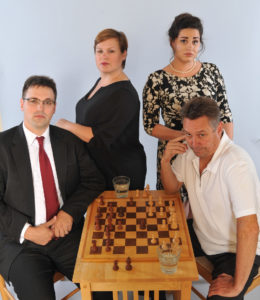
The principal cast of Livia Genise’s & Ashland Contemporary Theatre’s Chess (L to r): Alex Boyles (Anatoly), Rebecca Campbell (Svetlana), Haley Forsyth (Florence) & David King Gabriel (Freddie).
The biggest and most wonderful surprise in this cast was Haley Forsyth in the role of Florence. Ms. Forsyth has been in a number of Camelot and Oregon Cabaret Theatre shows in the several years since she arrived on the Southern Oregon scene, but always in supporting roles, never a major, leading part (including Helene in Sweet Charity and Angelique in La Cage.) She has been good in all of those smaller roles, attracting kudos from several reviewers, including myself.
“A reviewer for another publication approached me to ask, gushingly, “Who was that in the gold sequined dress? She was fantastic!” (Haley Forsythe) And so she was. . . . I am quite confident that her days of anonymity, not being recognized by reviewers are over. Her singing was quite lovely, her dancing was deft, but her acting was best of all. Somebody hurry up and cast that gal in a beefier role, so that talent doesn’t just languish on the sidelines.” [http://performingarts.reviews/2016/03/23/camelot-theatres-sweet-charity/]
I am thrilled to say that Ms. Genise has done precisely THAT, placing Ms. Forsyth in the Florence role in Chess, and Ms. Forsyth does not disappoint. My copious notes scribbled during the show declare: “Haley has elevated her game!” Her singing was a triumph – she more than held her own in duets with Mr. Boyles and Mr. King Gabriel, and when turned loose with a solo (Heaven Help My Heart), knocked it over the fences (my notes: “Such a pleasure! Sung with conviction and passion, complete with spot on gestures and facial expressions”). Her acting also rose to the challenge – her scenes with Mr. Boyles were particularly noteworthy. The lasting image I took from this show was Ms. Forsyth and Mr. Boyles emotionally clasping hands during the well sung duet, You and I. Again, singing a duet with the man introduced as her father (actor Buzz London), my notes attest “Ms. Forsyth very effectively pulls off this heavily emotionally laden scene”. From the moment she entered the stage in a very attractive black formal gown, to the Finale number, a Florence solo (my note: “Hayley just kills it!”), Ms. Forsyth is a revelation – a performance NOT to be missed. (And I would be remiss, if I didn’t mention that this bit of casting by Ms. Genise flies in the face of much criticism that she always uses the same few actors and never gives newcomers a break; e.g., see my review of Dirty Rotten Scoundrels at http://performingarts.reviews/2016/09/06/camelot-theatres-dirty-rotten-scoundrels/.)
The superlative performances by the three leads doesn’t even begin to convey the extent and depth of the wonderful singing, acting, and performances offered in this Chess production. A number of outstanding Camelot regulars, who have shined in major roles in other pieces, shine again in supporting roles here. The best voice on the stage belonged to Ms. Grace Peets, who has previously won kudos as Laurey Williams in Oklahoma!, Constanze in Amadeus, and unintentionally but inevitably upstaged the ensemble as Rosie in Sweet Charity (“try as she might to disappear into the ensemble, she’s just too good not to notice, and can’t really be ignored” [http://performingarts.reviews/2016/03/23/camelot-theatres-sweet-charity/]), plays a reporter and a member of the ensemble in Chess. But in her part here, she leads off several ensemble numbers with solo entrances, and oh, THAT beautiful voice. (My note during the ensemble number at the beginning of the show: “Grace is in great voice AND gorgeous in a terrific black gown” and leading off the Endgame number near the end of the show: “Grace Peets the BEST voice AGAIN! Under used AGAIN!”)
Although this production was an “in concert” presentation, stripped of most of the theatrical accoutrements and staging usually encountered in musical theater, one staging element it DID have was several dance numbers, and THOSE were fabulous – well choreographed, and well danced. The choreography and some of the best dancing were done by consummate Camelot choreographer, dancer and actress, Sarah Gore. Ms. Gore has repeatedly earned rave reviews in past productions, e.g., ““The choreography is superb throughout, sustaining much of the energy of the show and moving the story along nicely. . . . Camelot choreographer Sarah Gore deserves high praise for this effort.” [Jacksonville Review, Star Livia Genise and Camelot Theatre Deliver An Exceptional “Sunset Boulevard”, http://bit.ly/1GnbfIx] And “The choreography for this production of Sweet Charity . . . is sell-your-soul-to-the-devil good, unbelievably better even than the exemplary choreography in Sunset Boulevard.” [http://performingarts.reviews/2016/03/23/camelot-theatres-sweet-charity/] Add this show to Ms. Gore’s string of choreographic successes – I’m now convinced she got the better part of the deal with the devil. And she has some memorable, stand-out dance number performances in this production. Her dancing, as well as her choreography absolutely shine in the Golden Bangkok number, which include Ms. Gore being lifted and twirled by a male cast member ala a dance competition or an Olympic performance. Later she appears in a loose hanging red dress, for some truly impressive pairs dancing with the black-slacks-and-t-shirt wearing Payne! Smith.
Rebecca Campbell, who has starred in, directed, choreographed, and willed to success, innumerable Camelot productions, accepted a more modest part in this one, as Svetlana Sergievsky. Though the role may be smaller than some others, Ms. Campbell once again applies her formidable will and skill, to produce some of the best elements of this show. When she sings a duet with Mr. Boyles (You and I), her singing is lovely, and together with Mr. Boyles fine work, the number stands out as one of the best of the show. Then she sings a solo (Someone Else’s Story) delivering just a consummate performance. Asked about it later, she noted that she was familiar with the play and had sung the number before, so she was well prepared to tackle the role (it showed!).
Camelot veterans Heiland Hoff and Bob Miner deliver effective performances as Walter DeCourcy and the chess match “Arbiter”, respectively. Lacking scenery, a set, and most props, it falls to narrator Buzz London (also in the role of “Father”), to set the scenes, and he does an admirable job doing so – good enough not to break the audience’s “suspension of disbelief”. Ian Wexler is making himself typecast as a Russian heavy – besides playing Molokov here, he was the constable in Camelot’s Fiddler on the Roof. He is clearly having fun here, in a Russian accent, working the character’s various slick manipulations and delivering some of the best monologues. Frequent Camelot music director Karl Iverson takes the stage as part of the ensemble, but his more invaluable contributions are as Music Director, and providing orchestrations. This production is all about superb music (and the exemplary acting) and much credit for the high quality of the music falls on his shoulders. There are more, at least half a dozen, on stage, none of them delivering a less than good performance, but this write up has gotten unmanageably way too long already and I must stop somewhere. So apologies to those who’ve been omitted. All the cast were good, and no negative aspersions are intended, by cutting it short here and leaving some out.
So, the bottom line, as I announced above: “Who wins?” “Theatergoers!” But you cannot win, if you don’t go to the theater and see this show! By the time you are reading this, at most there are only two performances remaining: on September 24th at 8 pm and 25th at 2 pm at the Belleview Grange in Ashland, 1050 Tolman Creek Rd. Tickets can be purchased at Paddington Station in Ashland, Grocery Outlet in Medford or online at ACT’s website: http://ashlandcontemporarytheatre.org. For further information, call 541-646-2971.
